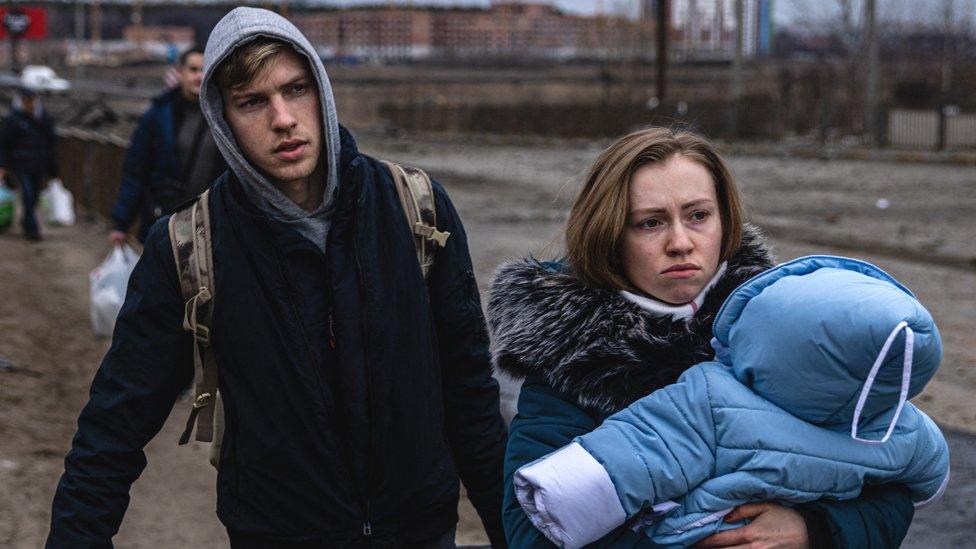Ukraine: 'My disabled nephew has a home in UK – but is stuck in Paris'
- Published
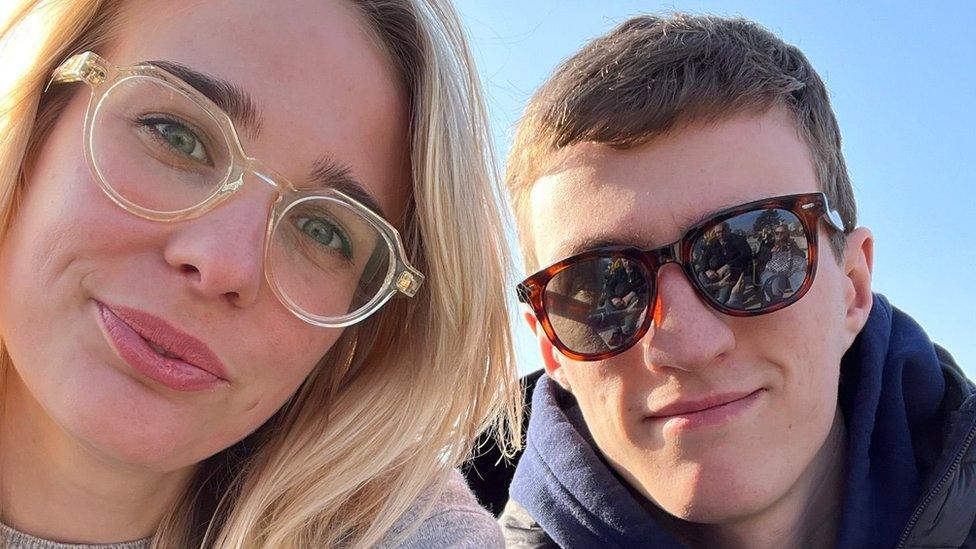
Kateryna and her nephew Nikita - she has lived in the UK for almost 10 years and has accommodation waiting for her family
A disabled teenager and his grandparents have been waiting in Paris for more than six weeks while their UK asylum application is processed. They told the BBC they are stuck in limbo, spending thousands of pounds on accommodation.
When Kateryna Karpenko persuaded her parents and nephew to leave Ukraine after Russian shells started falling, she thought it would not take long for them to join her in the UK.
Staff at the UK visa centre in Paris then said it would take a maximum of five working days for their paperwork to be processed and for asylum to be granted.
Six weeks on, they are still waiting.
"It kind of turned into a couple more days, couple more days, and now we're over a month," Kateryna says. "They had to go through a lot, fleeing Ukraine, and they have no idea what's happening with our home, our family, our lives."
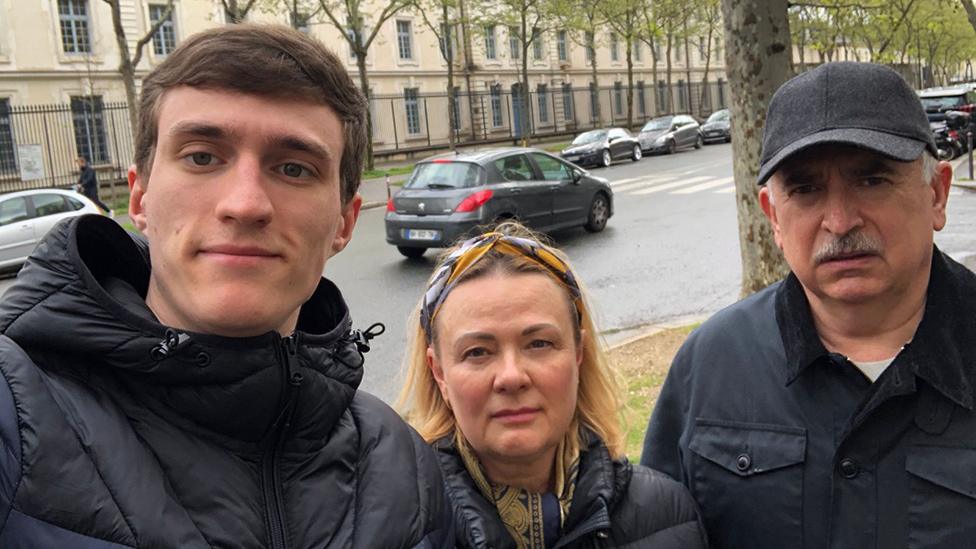
Nikita with his grandparents Oleksandr and Vira have spent weeks in Paris, waiting for a UK visa
Her parents Oleksandr and Vira Karpenko fled their home in Irpin with their grandson Nikita Shepel after the Russian regime bombed Oleksandr's workplace. The town on the outskirts of Kyiv was the centre of a key battle for the capital and heavily shelled by Russian forces before they were repelled.
Kateryna, who has lived in the UK for almost 10 years, says she promised to take care of them until they were able to return home, in return for knowing they were safe.
Her nephew's parents stayed behind in a relatively safe area, but they wanted him to leave Ukraine to enable him to get medical care for a condition he has had since childhood. The war meant he could no longer get health check-ups there.
Other cars on the road were being shot at while the trio fled. It took over a day for them to cross the border into Poland as so many others were also trying to leave.
"That was a sense of panic," Kateryna says. "So I wish I could give them that calm and the knowledge that we're all together as part of our family here in the UK. Instead they're stuck in this state of limbo."
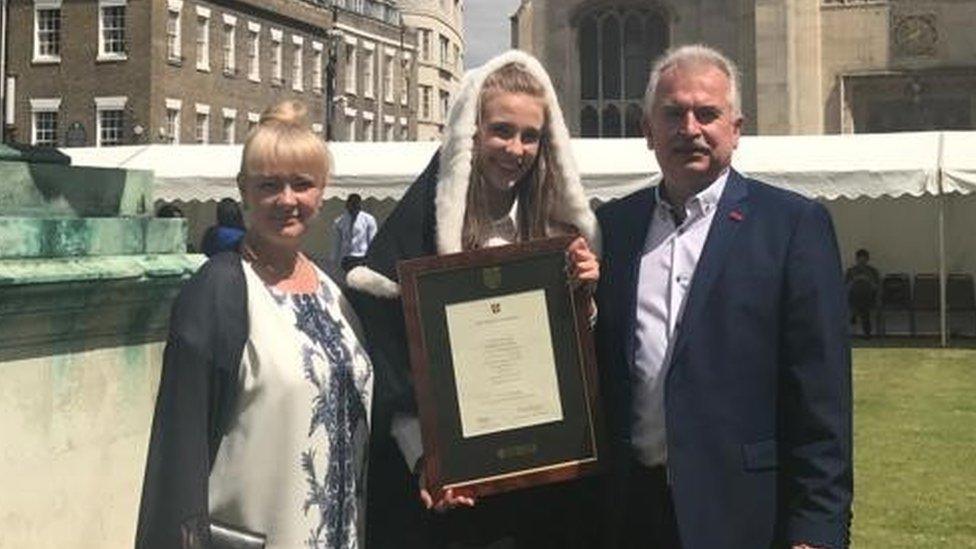
Kateryna, pictured here with her parents, graduated from Cambridge University four years ago
She was waiting for them in Krakow, Poland, when her parents and 19-year-old nephew arrived. There, they faced a two-week wait for an appointment to process the mandatory biometrics application.
The family decided it would be best to apply for UK asylum from Paris, where they could get an appointment within days. So they packed their belongings into two suitcases and drove for 22 hours to the French capital, where they remain. Kateryna then had to return to the UK.
The UK Home Office has been accused of a chaotic and overly-bureaucratic response to the Ukrainian refugee crisis. At the beginning of March, it launched a family visa scheme for Ukrainians who have an immediate or extended family member in the UK.
It then launched the Homes for Ukraine scheme, under which people in the UK can nominate an individual or family to stay with them rent-free for at least six months.
Figures released by the UK government on Thursday 21 April showed a total of 71,800 visas had been issued under the two schemes.
But, as of Monday 18 April, just 21,600 Ukrainians had arrived in the UK, according to figures from the Department for Levelling Up, Housing and Communities and the Home Office.
EU countries are allowing Ukrainian refugees in for up to three years without a visa and more than four million people have fled to neighbouring countries since the Russian invasion.
Home Secretary Priti Patel has insisted "security and biometric checks" were vital to keep British citizens safe.
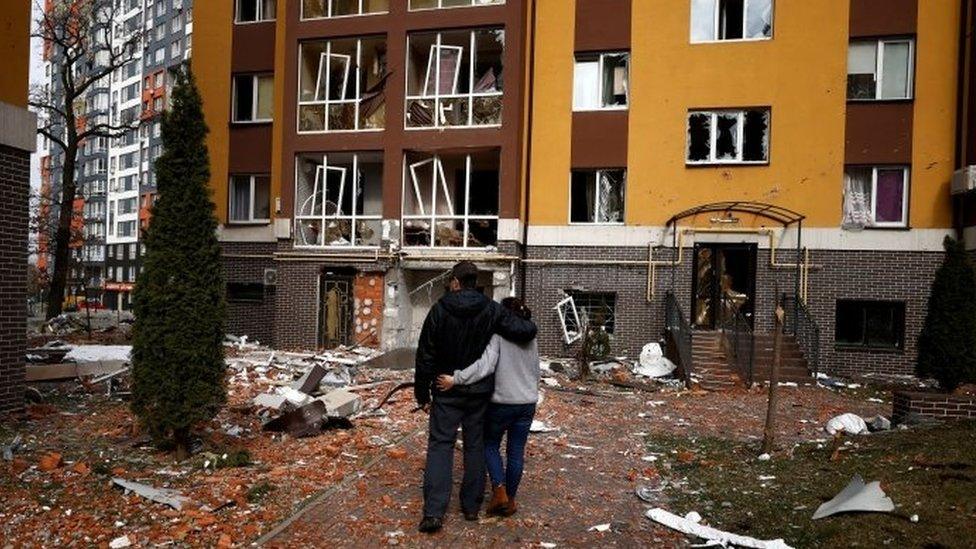
Many residential buildings in Irpin have been damaged or destroyed
Kateryna's family applied for the family scheme on 9 March and submitted their applications and biometric passports at the UK visa centre on 11 March.
They have received no update and, because of the uncertainty of the length of their stay, Kateryna has been unable to arrange stable accommodation.
Some friends in Paris have housed them for a few nights, but otherwise she has been looking for short-term AirBnBs, which is costing her thousands of pounds.
"It may seem like very small things because, you know, there's a war going on in Ukraine, but they have to check out from the flat at 11am, and the next place would only allow them to move in at 3pm. So they would have to wait around, even if it's rain or something, they have to find a place with a couple of their bags to stay until they can check in."
Kateryna feels frustrated that after their traumatic experience, she cannot tell them they are now safely in their second home.
"I qualify as a sponsor, I already have a place for them to stay, I can support them. All it takes is just for them to be able to physically cross the border, which is so, so close."
Kateryna says she has tried to access medical care for her nephew in France, but without identity papers they cannot proceed. Typically in Ukraine, he would see someone once a month to monitor his condition.
"I promised my sister, his mother, that I would take care of him. And I feel like I'm failing on that right now. So of course, it worries me."
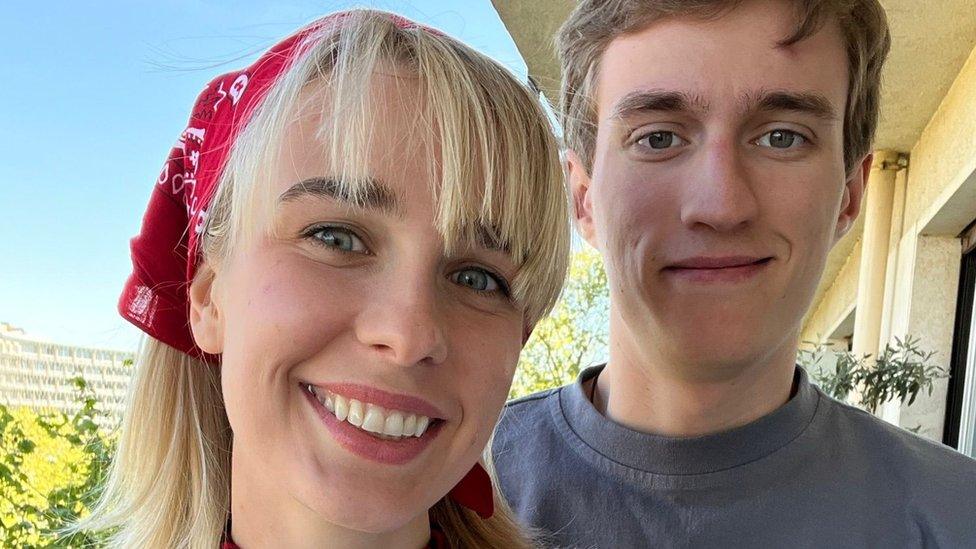
Nikita told the BBC he is finding living in Paris difficult, especially as he doesn't speak French
She is also unable to arrange care in the UK as she can't say when he will arrive.
Kateryna visited her family in Paris at Easter and speaks to them each day, but is frustrated by her lack of ability to help.
"I'm living here. I've been living here for the past 10 years. And I feel like, I can't do anything to get my family over here. So I feel sad and helpless, about what's going on."
From Paris, Nikita told the BBC, "I know that I need medical care, and I can't get it in France. That's why I know I need support in England."
He says the situation makes him feel bad.
"I don't know, what do I need to do? I don't know French at all. And my grandparents don't know the language too and they can't go to the shop to buy something. And we went to visa at the embassy more than five times and we can't get the answer. That's why we can stay only in the flat and wait for an answer from the embassy."
Kateryna says the British people have offered so much support and it was clear the public was open to Ukrainians coming to the UK.
"The people who want to come, they're fleeing from actual horror in their home countries, they're not coming here in search for something. They're just looking for refuge.
"So the ability to expedite the process, and for them to find some stability would mean a world to them, because of what they went through."
A government spokesperson has said it had launched one of the "fastest and biggest visa schemes in UK history" following the invasion and that "changes the Home Office has made to streamline the visa system, including simplifying the forms and boosting staff numbers, are working".
Additional reporting by Vinnie O'Dowd.

War in Ukraine: More coverage
DETENTION CAMPS: Refugees on trauma of filtration camps
ODESA ATTACK: 'My world was destroyed by a Russian missile'
READ MORE: Full coverage of the crisis, external
- Published8 April 2022
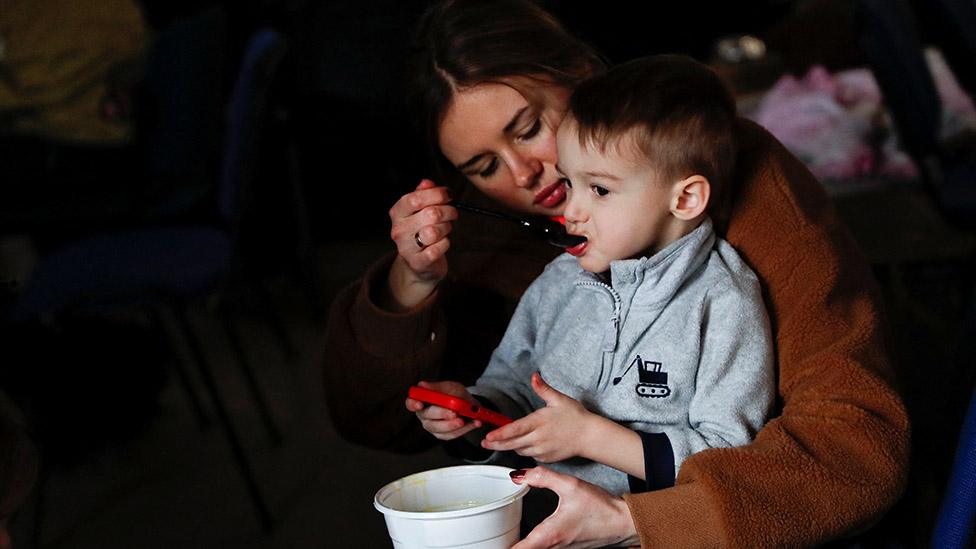
- Published8 March 2022
